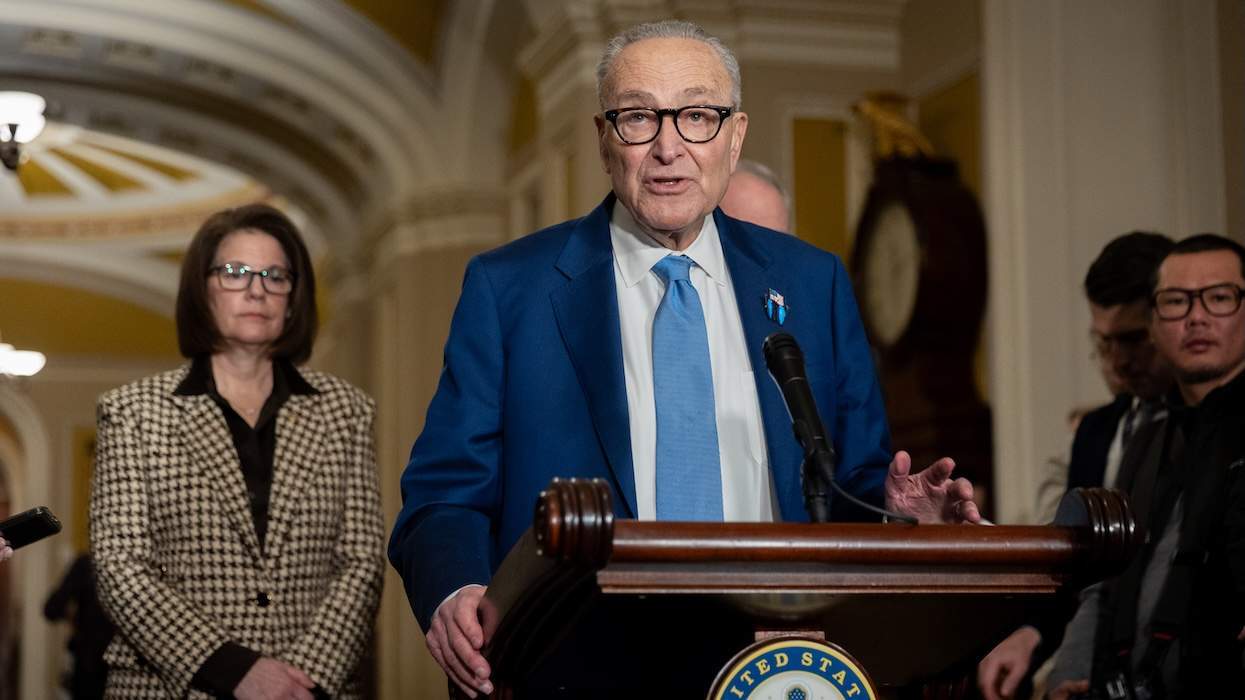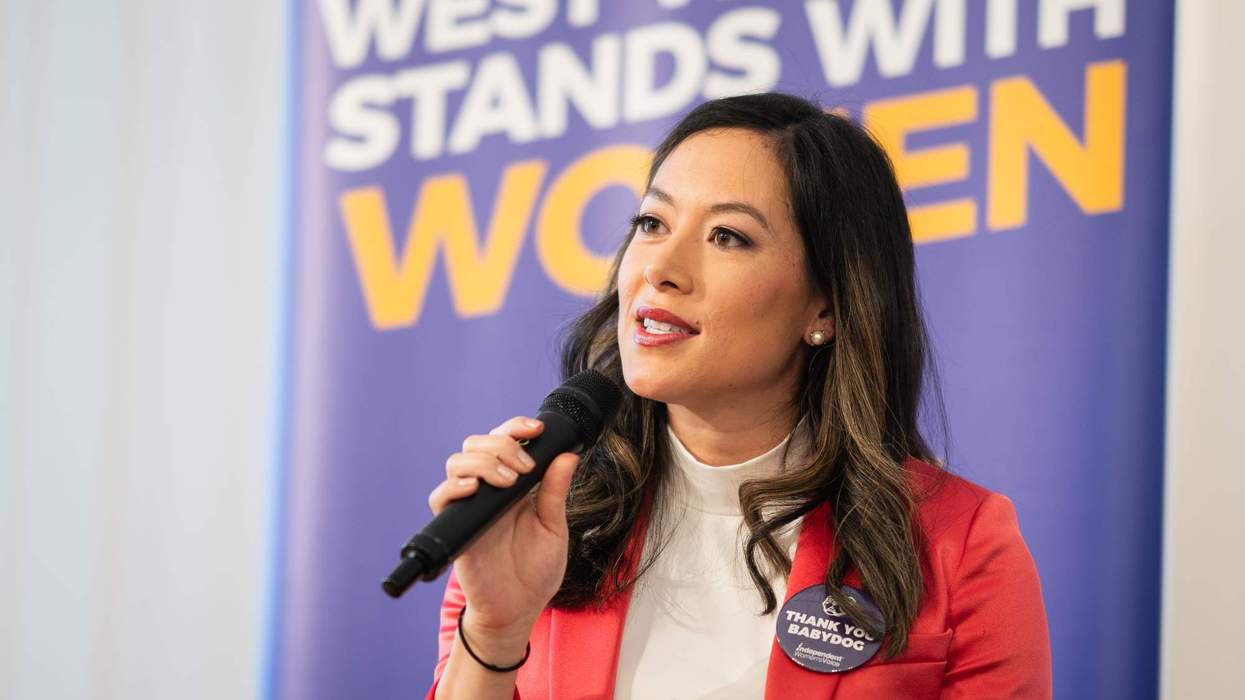The arc of history bent toward justice Friday when the Senate voted unanimously to confirm John Berry, an openly gay man, as director of the Office of Personnel Management.
OPM, formerly known as the U.S. Civil Service Commission, is the human resources department for 1.9 million federal employees, and was once responsible for scrubbing gays from the government -- a policy formalized in 1953 when President Dwight D. Eisenhower issued Executive Order 10450, making "sexual perversion" cause for termination.
"The federal government had a civil service gay ban which was quite ferociously enforced and resulted in the denial -- either by firings or non-hirings -- of endless numbers of people, during the 1950s especially," recalled Frank Kameny, who was dismissed from his job as an astronomer in the Army Map Service.
In 1957, Kameny was summoned by federal investigators who said they had "information" that led them to believe he was a "homosexual."
"'What information?' I said. And they said, 'We can't tell you,'" Kameny recounted over the phone about a month ago. "I said, 'Well, in that case, I can't give you an answer.'"
So began Frank Kameny's crusade at the age of 32 to end discrimination against gays and lesbians working for the federal government. "It became a personal project of my own to change the civil service commission," he said. Kameny took his case to the White House, to the civil service committees of both congressional chambers, and finally filed his own legal brief in 1961 petitioning the U.S. Supreme Court to hear his case, but was ultimately denied.
Eventually, he and others launched what he termed "picketing season" in 1965.
"We purposely didn't publicize them because we didn't want to give the bureaucrats some way to find a reason why we couldn't do it," he explained. But after the initial protest of about 10 people at the White House in April of 1965 went off without a hitch, they took their show to the Pentagon, the State Department, and, of course, the Civil Service Commission.
They closed out the year with a final White House action in October. "By the standards of our day, it was huge!" he recalled, before delivering the punch line. "We had 65 people," he said, chuckling at the success of the nascent movement.
At 83, soon to turn 84 in May, Kameny reeled off the chronology, date, and locations like they happened yesterday. Then he paused and asked again why I called.
I told him I wondered how he felt about the possibility that John Berry might be heading up OPM.
"I remember seeing his name somewhere," Kameny said of the news, "but I don't know terribly much about him."
I said I wasn't so much interested in his estimation of Berry as I was in the fact that a gay man might be heading the organization.
Silence weighted the other end of the line as I realized Mr. Kameny hadn't fully grasped the news.
"Oh, oh myaEUR|" he said as it settled in. "For the first time in this whole conversation, this is really registering on me. Oh, myaEUR|now I am impressed!" he said with a hint of glee in his voice. "Macy must be turning over in his grave," he added, referencing John W. Macy Jr., his archrival who chaired the commission in the '60s.
Legal firings of gay federal employees effectively ended in 1978, when President Jimmy Carter signed the Civil Service Reform Act. Bill Clinton added two executive orders, one that specifically reversed Eisenhower's edict and another that explicitly prohibited discrimination on the basis of sexual orientation in the federal civilian workforce.
But the playing field remains far from equal. Transgender federal employees still have no legal protections, and lesbian and gay workers cannot enroll same-sex partners on their health insurance plan, nor other spousal benefits afforded to heterosexual couples.
John Berry found that out firsthand in 1996 after his partner of 10 years, Thomas Leishman, died of AIDS-related complications. Following his confirmation hearing last week, Berry told the story of how his supervisor at the Smithsonian, Connie Newman, told him to take some time off in order to deal with the loss.
"It was one of the most wrenching things that's happened in my life," he said, "and luckily I had a manager who recognized that and provided that space."
At the time, Berry was a trust employee of the Smithsonian, which gave Newman flexibility in handling his personal situation. "But had I been a federal employee, the rules would not have allowed for any bereavement leave in that circumstance," he explained. "It's an example of distinction and discrimination that shouldn't exist."
Berry later pointed out that Newman was a Republican and an appointee of President George H.W. Bush.
"It's proof that good management and good ideas aren't the purview of one party -- they come from good people," he said during a phone call just after he heard the news that he had been confirmed. "I'm going to try to make federal benefits and the rules and regulations of the federal system as enlightened as I can," added Berry, whose current partner of 12 years, Curtis Yee, is also ineligible to receive benefits.
The sentiment echoed something he expressed during his hearing last week: He wants the U.S. government to be "the best in the world" and to become "a model" in human resources management.
"Obviously, one of the pieces of that puzzle is equal and fair treatment for all federal employees," he said, ticking off a list of marginalized groups: LGBTs, African-Americans, Latinos, people with disabilities.
"We need to draw upon the strength and diversity of our nation and we need to treat and accord fairly each and every one of them with benefits, and training, and with promotional opportunities that are second to none," he said.
Lofty goals at a time when many inequities in the federal government are being called into question. Two separate rulings from California's federal appeals court have found that same-sex partners of government employees should be provided health insurance. So far, OPM has told insurers that offering the benefits would be a violation of the Defense of Marriage Act, a 1996 law prohibiting federal recognition of same-sex marriages.
But Berry's unanimous confirmation is a sign of the respect he commands on Capitol Hill. Having managed multimillion-dollar budgets and hundreds of employees as director of the National Zoological Park and, prior to that, executive director of the National Fish and Wildlife Foundation, Berry's credentials are solid.
He also served as assistant secretary of the Interior Department under President Bill Clinton and spent a decade as the legislative director for House Majority Leader Steny Hoyer, who has been a key player on the Hill for years on federal employment issues.
The fact that Republicans and Democrats found consensus on Berry during the same week that not a single Republican voted for President Obama's budget also betrays how well-liked Berry is by his peers, regardless of which side of the aisle they sit on.
"He's one of the nicest people you'll ever meet in your life without being a pushover," said Len Hirsch of GLOBE, an organization that advocates for federal LGBT employees.
Hirsch noted that Berry will have plenty of obstacles on his hands, not the least of which is updating, streamlining, and synching government operations, which are notoriously inconsistent and outdated. "The government on a whole host of issues, including LGBT, has not been competitive with the private sector," Hirsch said, adding that the challenges were "daunting." The government will also be losing a huge brain trust in the coming years as baby boomers retire in enormous numbers.
But Berry seems unfazed. "Optimism is the nectar of progress," he said at one point in his hearing last week, demonstrating the same type of unflagging determination that Kameny employed in his battle.
And if anyone is up to the task, Beth Moten believes it's Berry. "The long and the short of it is, President Obama could not have made a better pick than John Berry for director of OPM," said Moten, the legislative and political director for the American Federation of Government Employees, a union representing 600,000 federal workers.
The only thing Moten -- who has known and worked with Berry for years -- couldn't decide was whether his intellect and command of policy or his overall affability and people skills were greater attributes for the job.
"It's hard to say which is more important," she said. "The ability to walk into a room and know within a half hour where everybody's pressure point is and what they need in order to make a deal -- that is a gift from God. If you've got that and you're smart enough to understand the substance, there's no stopping you. This town is built for someone like that."















